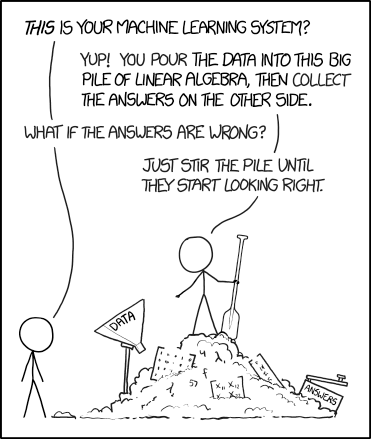03:00
1 - Introduction
Machine learning with tidymodels
Welcome!
Who are you?
You can use the magrittr
%>%or base R|>pipeYou are familiar with functions from dplyr, tidyr, ggplot2
You have exposure to basic statistical concepts
You do not need intermediate or expert familiarity with modeling or ML
Who are tidymodels?
- Simon Couch
- Hannah Frick
- Emil Hvitfeldt
- Max Kuhn
Many thanks to Davis Vaughan, Julia Silge, David Robinson, Julie Jung, Alison Hill, and Desirée De Leon for their role in creating these materials!
Asking for help
🟪 “I’m stuck and need help!”
🟩 “I finished the exercise”
👀
Tentative plan for this workshop
Today:
- Your data budget
- What makes a model
- Evaluating models
Tomorrow:
- Feature engineering
- Tuning hyperparameters
- Racing methods
- Iterative search methods
Introduce yourself to your neighbors 👋
Check Slack (#ml-ws-2023) for an RStudio Cloud link.
What is machine learning?

What is machine learning?

Illustration credit: https://vas3k.com/blog/machine_learning/
What is machine learning?

Illustration credit: https://vas3k.com/blog/machine_learning/
Your turn

How are statistics and machine learning related?
How are they similar? Different?
What is tidymodels? ![]()
library(tidymodels)
#> ── Attaching packages ──────────────────────────── tidymodels 1.1.0 ──
#> ✔ broom 1.0.5 ✔ rsample 1.1.1.9000
#> ✔ dials 1.2.0 ✔ tibble 3.2.1
#> ✔ dplyr 1.1.2 ✔ tidyr 1.3.0
#> ✔ infer 1.0.4 ✔ tune 1.1.1.9001
#> ✔ modeldata 1.1.0 ✔ workflows 1.1.3
#> ✔ parsnip 1.1.0.9003 ✔ workflowsets 1.0.1
#> ✔ purrr 1.0.1 ✔ yardstick 1.2.0.9001
#> ✔ recipes 1.0.6
#> ── Conflicts ─────────────────────────────── tidymodels_conflicts() ──
#> ✖ purrr::discard() masks scales::discard()
#> ✖ dplyr::filter() masks stats::filter()
#> ✖ dplyr::lag() masks stats::lag()
#> ✖ recipes::step() masks stats::step()
#> • Use tidymodels_prefer() to resolve common conflicts.The whole game
Part of any modelling process is
- Splitting your data into training and test set
- Using a resampling scheme
- Fitting models
- Assessing performance
- Choosing a model
- Fitting and assessing the final model
The whole game

The whole game

The whole game

The whole game

The whole game

The whole game

The whole game

Let’s install some packages
If you are using your own laptop instead of RStudio Cloud:
Check Slack (#ml-ws-2023) for an RStudio Cloud link.
Our versions
bonsai (0.2.1.9000, Github (tidymodels/bonsai@aab79), broom (1.0.5, local), dials (1.2.0, CRAN), doParallel (1.0.17, CRAN), dplyr (1.1.2, CRAN), embed (1.0.0, CRAN), finetune (1.1.0.9000, Github (tidymodels/finetune@52d), ggplot2 (3.4.2, CRAN), lightgbm (3.3.5, CRAN), lme4 (1.1-33, CRAN), modeldata (1.1.0, CRAN), modeldatatoo (0.1.0.9000, Github (tidymodels/modeldatatoo), parallelly (1.36.0, CRAN), parsnip (1.1.0.9003, Github (tidymodels/parsnip@e627), plumber (1.2.1, CRAN), probably (1.0.2, CRAN), purrr (1.0.1, CRAN), ranger (0.15.1, CRAN), recipes (1.0.6, CRAN), rpart (4.1.19, CRAN), rpart.plot (3.1.1, CRAN), rsample (1.1.1.9000, Github (tidymodels/rsample@afc4), scales (1.2.1, CRAN), stacks (1.0.2.9000, local), textrecipes (1.0.2, CRAN), tibble (3.2.1, CRAN), tidymodels (1.1.0, CRAN), tidyr (1.3.0, CRAN), tune (1.1.1.9001, Github (tidymodels/tune@fea8b02), vetiver (0.2.0, CRAN), workflows (1.1.3, CRAN), workflowsets (1.0.1, CRAN), yardstick (1.2.0.9001, Github (tidymodels/yardstick@6c), and Quarto (1.3.433)
